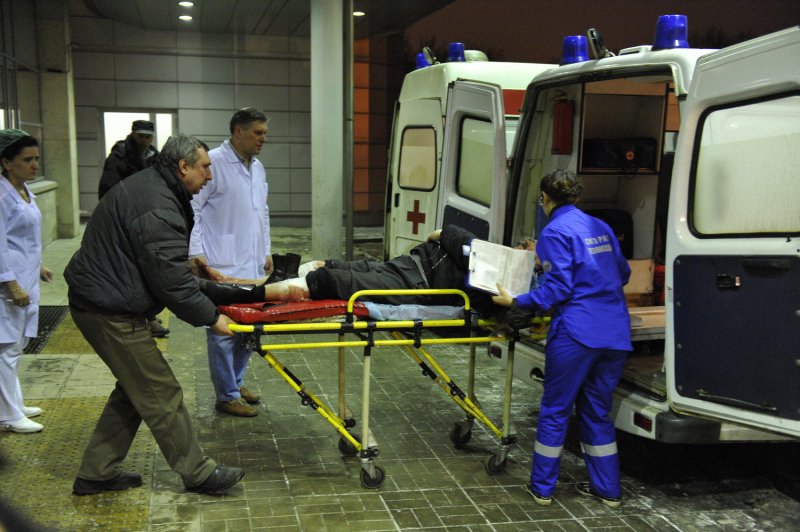1 of 6 | A wounded blast victim is brought by rescuers to a hospital from Domodedovo airport in Moscow on January 24, 2011. A suicide bomber killed at least 35 people and many injured at the Russian largest international airport. UPI |
License Photo
MOSCOW, Jan. 24 (UPI) -- A bombing at Moscow's busy Domodedovo Airport killed at least 35 people and injured dozens more.
The bomb detonated around 3:30 p.m. Monday in the crowded international arrivals hall "to which people who are not passengers have free access," airport spokeswoman Yelena Galanova told Russian news agency Interfax.
British traveler Mark Green told the BBC: "We were walking out through the exit of the arrivals hall toward the car and there was this almighty explosion, a huge bang ... my colleague and I looked at each other and said 'Christ that sounds like a car bomb or something,' because the noise was, literally, it shook you."
Photos and videos disseminated via Twitter showed devastating scenes from after the blast, with thick smoke and dust clouding the hall, men and women covered in blood and medics in blue overalls racing to treat the injured.
Russian President Dmitry Medvedev, in remarks on Russian television, said officials suspect a suicide bombing and are looking for three men in connection with the attack.
The perpetrators would be hunted down and punished, added Medvedev, who, after the news of the bombing, canceled his speech at the World Economic Forum in Switzerland, which had been scheduled for Wednesday.
While there has been no claim of responsibility, Russian officials suspect the attack is linked to Islamist groups destabilizing the Caucasus.
Russia's predominantly Muslim North Caucasus republics Chechnya, Dagestan and Ingushetia have seen an upsurge of violence recently, with frequent attacks by militants on police and political buildings. Russia has been fighting the insurgency for many years following two bloody conflicts in Chechnya in the 1990s.
Led by Doku Umarov, the insurgents aim to create an Islamic state based on Shariah
law stretching across the North Caucasus but have also attacked targets in Moscow.
Last March, suicide bombers linked to the Caucasus insurgency struck on two Moscow metro trains, killing 40 people and injuring more than 100.
Monday's attack sparked statements from leaders around the world. U.S. President Barack Obama and U.S. Secretary of State Hillary Clinton strongly condemned the attack.
"We stand with the people of Russia in this moment of sorrow and we offer our deepest sympathy to the families and loved ones of those injured and killed," Clinton said in a statement. "The United States remains ready to support the Russian government as it seeks to bring these perpetrators to justice."





